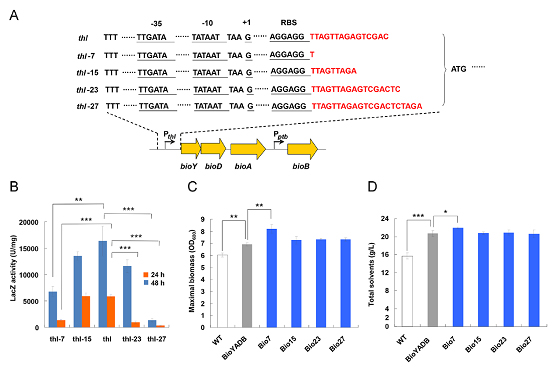Researchers Reveal the New Strategy for Modifying Solventogenic Clostridia
Solventogenic clostridia are attractive anaerobes because of their broad range of substrate and fermentation products. A wealth of metabolites, including bulk chemicals, biofuels and even antibiotics, can be produced via clostridia-based fermentation. Although it has promising applications, clostridia-based bioproduction remains economically unfavorable on the industrial-scale because of the inefficient fermentation process, which results in low product titer and productivity.
A research team led by Prof. Weihong Jiang at the Institute of Plant Physiology and Ecology (SIPPE), Shanghai Institutes for Biological Sciences (SIBS), CAS, previously discovered a novel “positive effect” of CcpA, a pleiotropic catabolite control protein from Gram-positive bacteria, on the performance of clostridia. Using comparative transcriptional analysis, they now reveal that biotin synthetic pathway is one of the major targets regulated by CcpA and directly influences the growth and product synthesis of clostridia. Overexpression of four essential genes for biotin uptake and synthesis in Clostridium acetobutylicum significantly improves the cellular performance. Fine-tuning gene expression by modifying the ribosome binding site further promotes the growth and solvents production of C. acetobutylicum in biotin-containing and biotin-free media. More importantly, biotin synthesis reinforcement also confers improved ability of clostridia to co-utilize hexose and pentose sugars, further demonstrating the potential of this metabolic-engineering strategy in solventogenic clostridia.
This study entitled “Improving the performance of solventogenic clostridia by reinforcing the biotin synthetic pathway” was published online in
Metabolic Engineering. Prof. Yang Gu and Prof. Weihong Jiang are co-corresponding authors of this paper. This work was supported by the National High-tech Research and Development Program of China (2015AA020202), National Natural Science Foundation of China (315700433, 1370133 and 31121001) and Youth Innovation Promotion Association CAS.

Construction of multiple regulatory parts to modulate the expression of the key genes for biotin synthesis. (A) Regulatory parts derived from the
thl promoter and the relevant RBS region. (B) LacZ reporter analysis for the strengthening of five regulatory parts. (C) and (D) Biomass and total solvents achieved by
C. acetobutylicum strains after engineering their biotin synthesis using various regulatory parts. The batch fermentations were performed in biotin-free medium. WT: the wild-type strain harboring the empty plasmid. The data in (B), (C) and (D) are the means and standard deviations of three replicates(***P ≤ 0.001; **P ≤ 0.01; *P ≤ 0.05; t-test).
